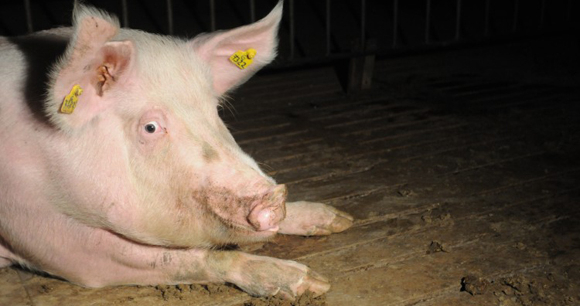
In February 2020, AWI, along with Farm Sanctuary, Animal Legal Defense Fund, Animal Outlook, Compassion in World Farming, Farm Forward, and Mercy For Animals, sued the US Department of Agriculture and its Food Safety and Inspection Service, alleging three causes of action. First, the FSIS denied the plaintiffs’ petition for rulemaking, which asked the department to end the cruel practice of allowing the slaughter of pigs who are unable to walk or move on their own (frequently referred to as “downed,” “nonambulatory disabled,” or “NAD” animals). Second, the FSIS failed to “investigate and submit to Congress a report on” nonambulatory pigs and their humane treatment, as required by a law enacted by Congress in 2002. And third, the FSIS failed to determine whether regulations to ensure the humane treatment of nonambulatory pigs were necessary, as required by the same law.
In 2002, Congress amended the Humane Methods of Slaughter Act (HMSA) to require the USDA to take regulatory actions to prevent inhumane handling at slaughter of “livestock”—defined under the law to include pigs. Under the Federal Meat Inspection Act (FMIA), the USDA is similarly required to prevent the sale of meat unfit for human consumption. As argued in the petition, the FSIS, which was delegated these duties by the secretary of agriculture, has failed to meet these statutory mandates by allowing the slaughter of NAD pigs to continue.
NAD pigs are much more likely to experience abuse at slaughterhouses relating to handling and moving the animals. Abuses observed by the FSIS itself include pigs being electroshocked, prodded, kicked, shoved, and dragged by workers attempting to force the animals to move. NAD pigs are also at a higher risk of carrying human-transmissible pathogens because they are held longer than ambulatory pigs, often in feces-ridden pens.
Because NAD animals are at a higher risk of being abused and transmitting disease in violation of the HMSA and the FMIA, the FSIS banned the slaughter of NAD cattle in 2007, and NAD calves in 2016. We, the plaintiffs, seek the same protection for pigs.
Our petition requested that, in order to meet its obligations under the HMSA and FMIA, the FSIS engage in rulemaking to end the slaughter of NAD pigs. Unfortunately, on September 16, 2019, the FSIS denied our petition, stating that its existing regulations and inspection procedures “are sufficient and effective” in ensuring that NAD pigs are humanely handled and in preventing diseased animals from entering the food supply. We deemed this response to be insufficient. As a last resort, we chose to sue the agency to force it to address its failures under the law. To learn more about humane slaughter, click here. To learn more about nonambulatory animals, click here.
Case Name: Farm Sanctuary v. Perdue
Nature of Case: The lawsuit, filed in the US District Court for the Western District of New York, asked the court to order the FSIS to investigate and report on nonambulatory pigs and whether their treatment was humane, and to promulgate necessary regulations based on those findings. The complaint also asked the court to set aside the FSIS denial of the plaintiffs’ rulemaking request, per the Administrative Procedure Act’s requirement that agencies not engage in arbitrary decision-making.
Court: US District Court, Western District of New York
Year Filed: 2020
Plaintiffs: Animal Welfare Institute, Farm Sanctuary, Animal Legal Defense Fund, Animal Outlook, Compassion in World Farming, Farm Forward, and Mercy For Animals
Defendants: Sonny Perdue (in his official capacity as secretary of agriculture), US Department of Agriculture, Food Safety and Inspection Service, and Paul Kiecker (in his official capacity as Food Safety and Inspection Service administrator)
Status: In March 2023, the court agreed with the FSIS’s arguments that the plaintiffs lacked standing to maintain the suit because they had not been sufficiently injured by the agency’s lack of action to report on or protect NAD pigs. In addition, the court ruled against plaintiffs on the merits of the case, finding that the FSIS’s denial of the rulemaking petition was adequately reasoned, and that the agency’s decision not to investigate, report on, or regulate the humane treatment of NAD pigs did not violate the law.
Relevant Documents
- Complaint
- USDA-FSIS denial of rulemaking petition
- Petition for rulemaking
- Denial of motion to dismiss
- Decision and Order